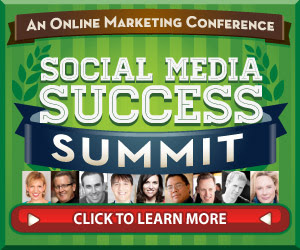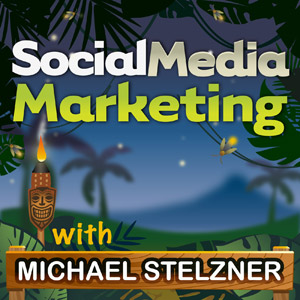 Do you consider yourself a thought leader?
Do you consider yourself a thought leader?
Want to know what it takes to become a guest on a major podcast or a speaker at large events?
In this episode I go behind the scenes at Social Media Examiner with Phil Mershon.
More About This Show
The Social Media Marketing podcast is an on-demand talk radio show from Social Media Examiner. It's designed to help busy marketers and business owners discover what works with social media marketing.
In this episode I interview Phil Mershon, director of events at Social Media Examiner. This show is the official third anniversary of the Social Media Marketing podcast.
Phil and I will explore how we pick the thought leaders in our industry for our conferences and podcast.
You'll discover how to become a thought leader in any industry.

Share your feedback, read the show notes and get the links mentioned in this episode below.
Listen Now
Where to subscribe: Apple Podcasts | Spotify | YouTube Music | YouTube | Amazon Music | RSS
Here are some of the things you'll discover in this show:
Thought Leadership
What thought leadership means
Phil talks about the two parts that go into being a thought leader. First, there's the “thought” element. It starts with people who have excellent forward thinking, stay on the cutting edge and push boundaries, understand deeply how things work and are able to articulate it.
And second, they must be a “leader,” someone whom others listen to and follow. A thought leader does those things over time, consistently producing material that people will listen to month in and month out.
Before I started Social Media Examiner, I was called one of the leading authorities in the white paper world. To earn that, I constantly wrote articles, started a blog, did training, wrote a book, summarized industry research and had a monthly newsletter.
Get World-Class Marketing Training — All Year Long!
Are you facing doubt, uncertainty, or overwhelm? The Social Media Marketing Society can help.
Each month, you’ll receive training from trusted marketing experts, covering everything from AI to organic social marketing. When you join, you’ll also get immediate access to:
- A library of 100+ marketing trainings
- A community of like-minded marketers
- Monthly online community meetups
- Relevant news and trends updates

Establishing yourself as a thought leader is a lot of work. Even harder is maintaining it. Mari Smith is an excellent example of someone who chose to own her title of “Facebook Expert,” and is having great results.
Listen to the show to discover how long Phil and I have been working together and what we did before Social Media Examiner.
How we decide who should be on the podcast and on our stages
When deciding on our content, we ask two questions: “What should people speak about?” and “Who should speak about those subjects?”
To determine what people will speak about, we look very carefully at the data, Phil explains. We study our annual Social Media Marketing Industry Report, which is based on the subjects our readers tell us they do and do not care about. It influences decisions about the kinds of speakers we need to find, which sometimes means we need to seek out experts we don't know yet.
If you want to pitch yourself to a conference or podcast, it's important to first study it. Look at the organization's typical lineup to see what kinds of things people are speaking about, and determine if you're a fit.

Not every thought leader is appropriate for every situation. We get inquires all the time from people who pitch us things that aren't appropriate.
Listen to the show to hear how booking speakers is like programming for television.
What we look for in our speakers
Phil and I share the four criteria we look for in a speaker.
1. Are they a great communicator?
We're not just looking for inspirational communicators, we are looking for people who can explain or teach at a very deep level how to use the different social media platforms.
A lot of people think they're great communicators, but a lot of people also think they're good drivers. I share how when Sally Hogshead was keynoting at Social Media Marketing World, she said “Raise your hand if you think you are a good driver.” About 95% of the hands went up in the room. Then she says, “Interestingly enough, research shows that only 55% of people are good drivers, so that means that about 40% of you are kidding yourself.”
A great communicator is someone with the ability to clearly transmit information and ideas in a way that moves and enables people to take action on what they learned.

To determine if someone fits our needs, we like to see video footage of them teaching. Speaker reels, where people splice together examples, aren't very helpful. We like to see at least a 10- to 15-minute uncut clip of someone talking about the same subject.
We also listen to podcasts, because part of being a good communicator is the ability to handle the uncertainty that comes when you're being interviewed. It's a lot different than giving a prepared presentation on the stage.
Keep in mind, a worthwhile organization is not just going to look at the material you send them, they're going to do an Internet search to seek out additional information.
If you're a speaker who wants to be on a bigger stage, film your own clips. Bring a video camera when you speak. It doesn't have to be great quality. We can overlook poor video quality, as long as what you're doing is good quality.
2. Do they have deep subject matter expertise in an area that we care about?
There are a lot of generalists out there who understand a lot of things about domains in our industry. They might know a little bit about a few different social networks, but we need to know if they can they teach for an extended period of time about very specific things.

At Social Media Success Summit, we cover Facebook, visuals, analytics, content, LinkedIn, Instagram, Twitter, Pinterest, tools, YouTube, Google+ and more. Many marketers who might pitch us to speak use a lot of different platforms and have substantial knowledge.
However, if we check their website and don't see obvious examples of thought leadership (detailed blog posts, podcasts, etc.), we classify them as generalists. Although 95% of speakers are generalists, they are not the ones on our stage.
If the potential speaker's expertise is not obvious on his or her website, we're likely to take a pass; that is, unless there's a compelling reason to take another look.
Don't be afraid to own your expertise. For example, Ian Cleary is known as the tools guy for the social media marketing industry, because he really goes deep into the subject and stays current. We look for that type of speaker.
3. Have they written a book?
We seriously consider people who have gone through the craziness of writing a book; those who have worked very hard to convey the topic of their expertise into words that others can understand. Authors are not always great communicators, but you can usually tell when you read the book that they know what they're talking about. The book can be self-published or an ebook, it doesn't have to come from a large publisher.
Phil adds that we do look at the quality and the content of the book. If it's mostly pictures and not a lot of text, we'll look at it differently than a 200-page book that goes really deep. However, the fact that someone has gone through the trouble of writing and publishing a book sets them apart from a lot of other speakers in the industry.
Creating an online course doesn't count as significantly as publishing a book, but podcasting comes close.
Phil recently heard Neal Schaffer speak on a podcast about how easy it is to write a book, if you're consistently writing blog posts or podcasting.

You really only need 48 blog posts to make a book. Convert the posts into 12 chapters with 4 points per chapter. If you're consistently demonstrating thought leadership already, it's not that difficult.
I believe the whole process of writing, publishing and promoting a book really helps you refine your message and turns you into a better teacher.
4. Is this person known and respected in our industry?
We look at the size of a potential speaker's audience, both their email list and social media platforms, to see if this is a person our peers respect. We also often ask our friends and our audience whom they recommend on certain subjects. One thing that differentiates us from others is this is the least important factor.
For other industries, this could be your “in,” but not for ours. Just because someone has a huge following on Twitter doesn't mean he or she is a good communicator, has the deep subject matter expertise and has written a book. Other groups want these people on stage to get exposure to their audience. We are more focused on the content than the fame of the person. Fame does not equal quality.

Discover Proven Marketing Strategies and Tips
Want to go even deeper with your marketing? Check out the Social Media Marketing Podcast! Publishing weekly since 2012, the Social Media Marketing Podcast helps you navigate the constantly changing marketing jungle, with expert interviews from marketing pros.
But don’t let the name fool you. This show is about a lot more than just social media marketing. With over 600 episodes and millions of downloads each year, this show has been a trusted source for marketers for well over a decade.
Listen to the show to hear how many of these four criteria we require for our speakers.
What differentiates the best thought leaders from the rest
The best thought leaders like to learn and stay current, and also love to teach. They're passionate about their subject.
Mark Schaefer, who has been on our stage many times, is someone who tries to stay current. He writes about things he wants to know more about.

He shares his knowledge, is free with his time and constantly takes protégés under his wing. He cites research from the academic world, reads publications not in the social media space and ties ideas together. He sees trends and explains things in ways that connect with audiences. Mark is going to stay a thought leader because of all of these things he does.
Another person who is a great example of a thought leader is Brian Fanzo, who recently did our podcast on Meerkat and Periscope.
Brian is an early adopter of mobile broadcasting apps. He saw the opportunity to quickly figure out what it meant to marketers, rapidly build relationships and leverage his new knowledge to start speaking on the subject. He doesn't have a book, but he has incredible passion for his topic. He's an excellent communicator (very articulate), he has a couple of different podcasts and is developing a deep knowledge base on his subject.
Phil adds that great thought leaders have a servant heart (meaning they're willing to give their knowledge away) and they deliver. They want to serve this community and give away their very best stuff.
Listen to the show to hear my thoughts on how quickly experts in the social media space change.
Why thought leaders don't remain in the spotlight
There are many reasons thought leaders may falter. They don't stay current, become complacent and stop doing research in their field.

Also, some thought leaders forget where they came from. Great leaders remember their roots and are willing to help people who are just getting started. They're not afraid of that competition, and they have a welcoming attitude.
Part of the issue is what I call the “fame trap.” There are thought leaders in every industry who have bad attitudes and are still famous. They act like divas because they feel they're supposed to. I don't think anyone loves being around those people and the only reason they have a following is because they're famous.
My message to anyone who wants to be a thought leader is to always remain who you are and stay genuine. Don't think that once you get on the big stage, you can change your attitude. You need to treat the big guy and the little guy the same way.
Listen to the show to hear parting thoughts from Phil and me.
Discovery of the Week
Facebook has a number of cool security features that you may not realize are available. To access them, log into Facebook, go to Settings and click on Security.

These are the top five features to consider.
1. Turn on login alerts. This will alert you every time someone logs into your account from a new app or a new browser.
2. Turn on login approvals. According to Facebook, this adds an extra layer of security. It will text you on your phone and give you a code.
3. Use the code generator. Get to the code generator predominantly through your mobile device. Open up your Facebook mobile app, and along the left, go to Code Generator. If you ever lose your phone, you can use the code generator. It provides a number you need to put into your Facebook account in a very short period of time in order to get in.
4. Trusted contacts. Pick three people whom you really trust. If you ever get locked out of your Facebook account, the Trusted Contacts can get you back in.
5. Legacy contact. Determine who will take over your account and carry on your legacy if you should pass away.
Set up these features inside Facebook to keep your account more secure.
Listen to the show to learn more and let us know how these Facebook security options work for you.
Other Show Mentions
 Today’s show is sponsored by Social Media Success Summit 2015.
Today’s show is sponsored by Social Media Success Summit 2015.
Want to improve your social media marketing? Need to prove your efforts are working? Join 4,000 fellow marketers at the online mega-conference, designed to inspire and empower you.
Discover the best and newest ways to market your business on Facebook, LinkedIn, Twitter, Google+, YouTube, Instagram and Pinterest. Find new ways to improve your content and measure your results all from the comfort of your home or office.
You'll be led by dozens of top social media pros, including Mari Smith, Mark Schaefer, Amy Porterfield, Christopher Penn, Neal Schaffer, Ian Cleary, Viveka Von Rosen, Jon Loomer, Andrea Vahl, Steve Dotto, Amy Schmittauer, Peg Fitzpatrick, Brian Fanzo, Sue Zimmerman, Kim Garst, Andy Crestodina, Pam Moore, Martin Shervington, Ron Nash, Donna Moritz, Michael Stelzner and more. We have selectively recruited the top experts in every major social network to share tactical, step-by-step, hands-on information.
Jen Herman will be presenting again this year at Social Media Success Summit, and she'll be talking about how to use Instagram analytics to better target your ideal audience. In addition to analytics, she'll discuss tools and different methods to use on Instagram to get your target audience more actively involved and grow your business.
Social Media Success Summit is an online conference. It's 36 different sessions spread across 4 weeks. There are 3 sessions per day, 3 times per week, over 4 weeks. And it's on every conceivable social media platform you can imagine. Check it out. Visit SMSS15.com for significant early bird discounts.
Listen to the show!
.
Key takeaways mentioned in this episode:
- Learn more about the 2015 Social Media Success Summit and Social Media Marketing World.
- Listen to our podcasts.
- Learn more about Mari Smith, Sally Hogshead and Ian Cleary.
- Check out Neal Schaffer and listen to the podcast in which he talked about writing a book.
- Learn more about Mark Schaefer and social sharing, as well as Brian Fanzo and his Meerkat and Periscope expertise.
- Check out the Facebook security options.
- Read the 2015 Social Media Marketing Industry Report.
Help Us Spread the Word!
Please let your Twitter followers know about this podcast. Simply click here now to post a tweet.
If you enjoyed this episode of the Social Media Marketing podcast, please head over to iTunes, leave a rating, write a review and subscribe. And if you listen on Stitcher, please click here to rate and review this show.

Ways to subscribe to the Social Media Marketing podcast:
- Click here to subscribe via iTunes.
- Click here to subscribe via RSS (non-iTunes feed).
- You can also subscribe via Stitcher.
How to Subscribe to this Podcast on an iPhone
Watch this quick video to learn how to subscribe on your iPhone:
.
What do you think? What are your ideas on thought leadership? Please leave your comments below.
Businessman in light photo, Puzzle photo, Conference presenter photo, Expert wordcloud photo and Wood wall photo from Shutterstock.
Meerkat login image created with Placeit.

Attention Agency Owners, Brand Marketers, and Consultants

Introducing the Marketing Agency Show–our newest podcast designed to explore the struggles of agency marketers.
Join show host and agency owner, Brooke Sellas, as she interviews agency marketers and digs deep into their biggest challenges. Explore topics like navigating rough economic times, leveraging AI, service diversification, client acquisition, and much more.
Just pull up your favorite podcast app, search for Marketing Agency Show and start listening. Or click the button below for more information.

